-
 Bitcoin
Bitcoin $104,248.9280
1.33% -
 Ethereum
Ethereum $2,694.6911
8.12% -
 XRP
XRP $2.5765
1.17% -
 Tether USDt
Tether USDt $1.0001
0.01% -
 Solana
Solana $183.0201
5.19% -
 BNB
BNB $665.6122
0.40% -
 USDC
USDC $1.0000
0.00% -
 Dogecoin
Dogecoin $0.2398
3.63% -
 Cardano
Cardano $0.8323
1.14% -
 TRON
TRON $0.2713
-0.06% -
 Sui
Sui $4.0710
2.26% -
 Chainlink
Chainlink $17.5757
4.81% -
 Avalanche
Avalanche $25.8817
3.65% -
 Stellar
Stellar $0.3152
0.04% -
 Shiba Inu
Shiba Inu $0.0...01636
3.59% -
 Hedera
Hedera $0.2170
0.12% -
 Pi
Pi $1.2460
-1.55% -
 Hyperliquid
Hyperliquid $26.0435
5.15% -
 Toncoin
Toncoin $3.4164
1.81% -
 Polkadot
Polkadot $5.2072
2.13% -
 Bitcoin Cash
Bitcoin Cash $412.4948
0.62% -
 UNUS SED LEO
UNUS SED LEO $8.6932
1.42% -
 Litecoin
Litecoin $103.9881
1.25% -
 Monero
Monero $340.8560
1.21% -
 Pepe
Pepe $0.0...01457
6.71% -
 Bitget Token
Bitget Token $4.8502
1.98% -
 Dai
Dai $1.0000
0.00% -
 Ethena USDe
Ethena USDe $1.0007
-0.01% -
 Uniswap
Uniswap $7.1519
3.69% -
 Bittensor
Bittensor $465.2946
0.86%
How to prevent cryptocurrency wallets from being hacked?
Secure your crypto with strong, unique passwords, two-factor authentication, and hardware wallets for large sums; avoid phishing scams and public Wi-Fi.
Feb 28, 2025 at 01:15 pm
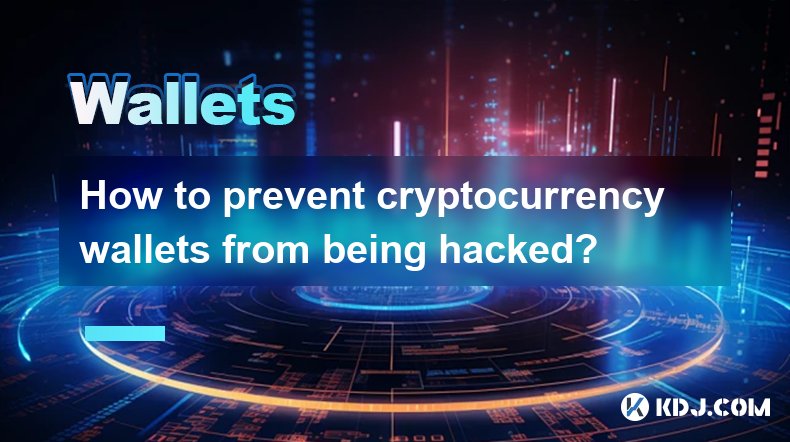
Choose a safe wallet type
Hardware wallets: Hardware wallets like Ledger Nano S and Trezor store private keys on physical devices, which greatly reduce the risk of hacker attacks, and are suitable for long-term large-scale storage.
Software wallet: Choose well-known and well-known, such as Exodus Wallet. Download from regular channels, update regularly, and enable multiple security settings, which is suitable for daily small transactions.
Paper wallet: Print the private and public keys on paper and completely offline. But choose high-quality paper and store it properly to avoid damage or loss.
Enhanced password security
Set strong password: sufficient length, contains upper and lower case letters, numbers, special characters, and avoid using personal information, such as birthdays, names, etc.
No reuse: Each cryptocurrency wallet has a unique password. If a certain platform password is leaked, other wallets will not be affected.
Regular replacement: It is recommended to change the wallet password every 3-6 months to reduce the risk of password cracking.
Use password managers: like LastPass, 1Password, etc., to safely store and manage complex passwords, automatically fill, convenient and safe.
Enable two-factor authentication
SMS verification code: After opening, in addition to the password, the login wallet also requires the verification code received by the mobile phone to increase login security.
Authenticator applications: such as Google Authenticator and Authy, generate dynamic verification codes without relying on SMS to prevent SMS interception risks.
Biometric technology: If the device supports it, such as fingerprint recognition and facial recognition, it can further ensure the security of the wallet after it is turned on.
Manage private keys with caution
No sharing: Private key is the core of the wallet and will never be disclosed to anyone, including the so-called "customer service" and "technical support".
Avoid network storage: do not store private keys on network platforms such as cloud disk, email, and social software to prevent hackers from stealing them.
Paper backup: Handwritten private keys or mnemonic words are stored on paper in a safe place that is waterproof, fire-proof and loss-proof, such as a safe.
Multi-site backup: The private key or mnemonic word can be divided into several parts and stored in different safe locations to reduce the overall risk of loss.
Beware of phishing attacks
Be careful about links: Do not click on unknown links in emails, text messages, or social media at will, especially those involving wallet operations and transactions.
Verify the URL: Log in to your wallet or trading platform, manually enter the official website, or enter from your favorites to prevent entry into the phishing website.
Anti-counterfeiting applications: Only download the wallet application from the official application store, view developer information and user reviews before downloading, and anti-counterfeiting applications.
Identify phishing emails: Be vigilant about emails that require private keys, passwords, verification codes, or claim that account abnormalities need to be handled urgently, and the official agency will not do so.
Ensure equipment and network security
Install antivirus software: Install well-known antivirus software on computers, mobile phones and other devices, regularly update the virus database and scan the entire disk.
Turn on the firewall: The firewalls of computers and routers can block some hackers' attacks, and enable and properly configure relevant rules.
No public Wi-Fi: Avoid operating cryptocurrency wallets under Wi-Fi in public places such as cafes and airports. If you have to use them, you can encrypt the network connection via VPN.
Update the system and software in a timely manner: Updates to operating systems, wallet applications and other related software often fix security vulnerabilities, set up automatic updates or updates manually regularly.
Regularly backup your wallet
Backup frequency: Back up wallet data at least once a month. If transactions are frequent, you can back up weekly.
Multi-way backup: In addition to mnemonics, you can also back up wallet files and store them on external hard disk, USB flash memory and other devices.
Test recovery: Restore wallet regularly with backup data to ensure that the backup is effective and avoid the inability to recover assets when really needed.
Monitor account activities
Daily viewing: Check wallet transaction records every day or regularly to promptly discover abnormal transactions, such as transfers and expenses that are not operated by yourself.
Set reminder: Some wallets support setting transaction reminders, such as large-scale transaction reminders, remote login reminders, etc., to enable them to detect abnormalities in a timely manner.
Timely response: If you find an abnormality, modify your password immediately, contact the wallet customer service, call the police if necessary, and provide relevant evidence to assist in the investigation.
Avoid operating in unsafe environments
Do not borrow devices: Do not use other people's computers or mobile phones to operate cryptocurrency wallets to prevent the device from being implanted with malware.
No public computers are needed: Computers in public places such as Internet cafes and libraries may have security risks and no wallet-related operations may be carried out.
Pay attention to Bluetooth and USB: When connecting external devices, ensure the device is safe and do not connect Bluetooth devices or USB devices from unknown sources at will to prevent data theft.
Continuously learn safety knowledge
Pay attention to industry trends: Pay attention to cryptocurrency industry news and forums to learn about the latest security threats and prevention methods.
Participate in training: If possible, you can participate in cryptocurrency security training courses to systematically learn security knowledge and operation skills.
Exchange experience: Exchange security experience with other cryptocurrency investors, share problems and solutions, and jointly improve security awareness.
Disclaimer:info@kdj.com
The information provided is not trading advice. kdj.com does not assume any responsibility for any investments made based on the information provided in this article. Cryptocurrencies are highly volatile and it is highly recommended that you invest with caution after thorough research!
If you believe that the content used on this website infringes your copyright, please contact us immediately (info@kdj.com) and we will delete it promptly.
- Ethereum (ETH) Price Rallies Over 8% to Reach a Daily High of About $2702
- 2025-05-14 07:05:13
- Unstaked (ADA) Price Analysis and SHIB Dip Flash Red, Unstaked's AI Presale Races Past $5M
- 2025-05-14 07:05:13
- Solana's $10.9 Billion TVL Surpasses the Entire Ethereum Layer-2 Ecosystem
- 2025-05-14 07:00:12
- When Crypto Projects Combine Useful Features or Strong Stories, They Often Get Noticed
- 2025-05-14 07:00:12
- How to purchase Bitcoin safely
- 2025-05-14 06:55:13
- Will Nvidia Add Bitcoin to Its Treasury Following Recent Speculation?
- 2025-05-14 06:55:13
Related knowledge
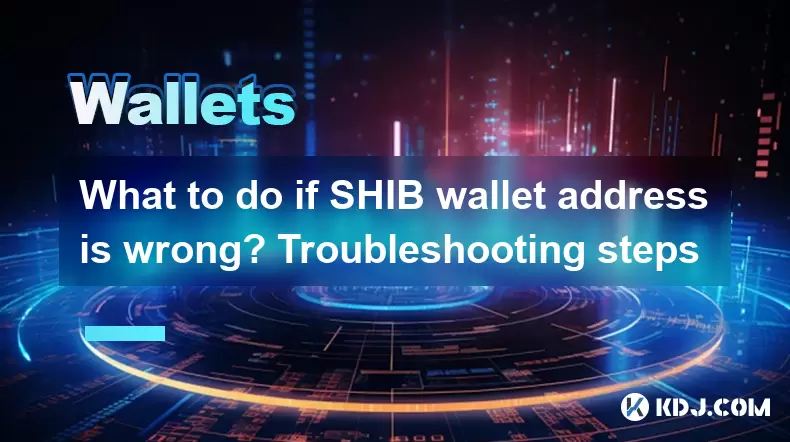
What to do if SHIB wallet address is wrong? Troubleshooting steps
May 14,2025 at 04:28am
If you've entered the wrong SHIB wallet address, it can be a stressful situation, especially if you've already sent your SHIB tokens. However, there are several steps you can take to troubleshoot and potentially resolve the issue. Let's walk through the process step-by-step. Verify the Transaction DetailsThe first thing you should do is verify the trans...
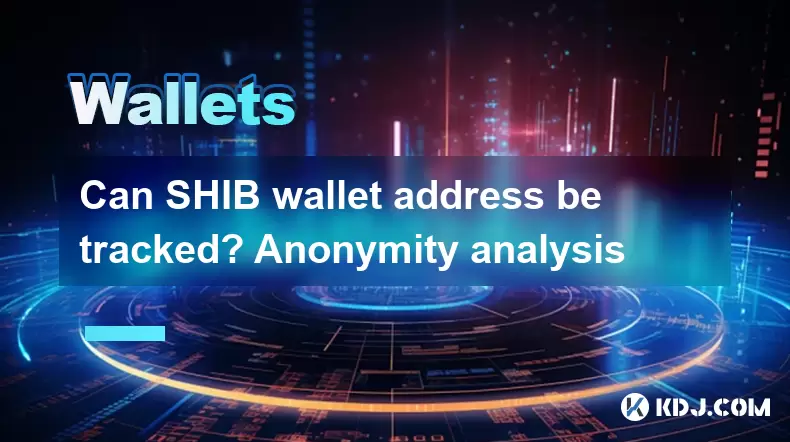
Can SHIB wallet address be tracked? Anonymity analysis
May 14,2025 at 06:50am
The question of whether a SHIB wallet address can be tracked and the level of anonymity it provides is a crucial concern for many users in the cryptocurrency space. SHIB, or Shiba Inu, is a popular meme token that operates on the Ethereum blockchain. Understanding the traceability of SHIB wallet addresses involves delving into the nature of blockchain t...
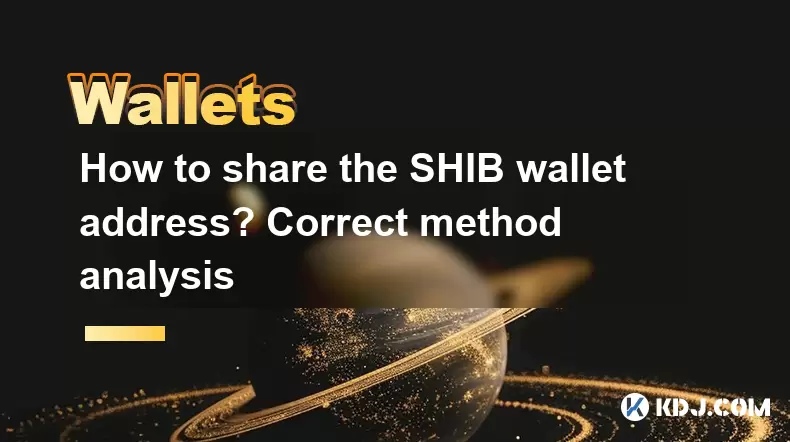
How to share the SHIB wallet address? Correct method analysis
May 14,2025 at 02:50am
Sharing your SHIB wallet address is a common task for those involved in the cryptocurrency world, particularly if you're dealing with Shiba Inu (SHIB) tokens. However, it's crucial to understand the correct methods to share your wallet address to ensure the safety and security of your funds. This article will guide you through the process and highlight ...
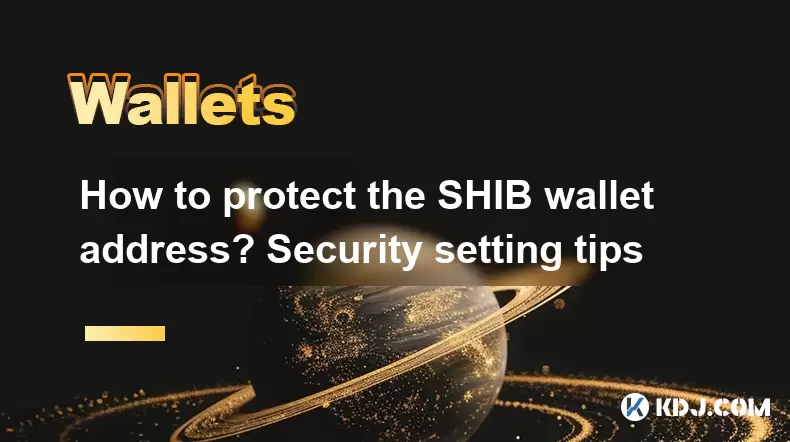
How to protect the SHIB wallet address? Security setting tips
May 13,2025 at 04:07pm
Protecting your SHIB wallet address is crucial to safeguarding your cryptocurrency assets. With the rise of digital currencies, securing your wallet has become more important than ever. This article will provide you with detailed security setting tips to ensure your SHIB wallet remains safe from potential threats. Understanding SHIB Wallet SecurityBefor...
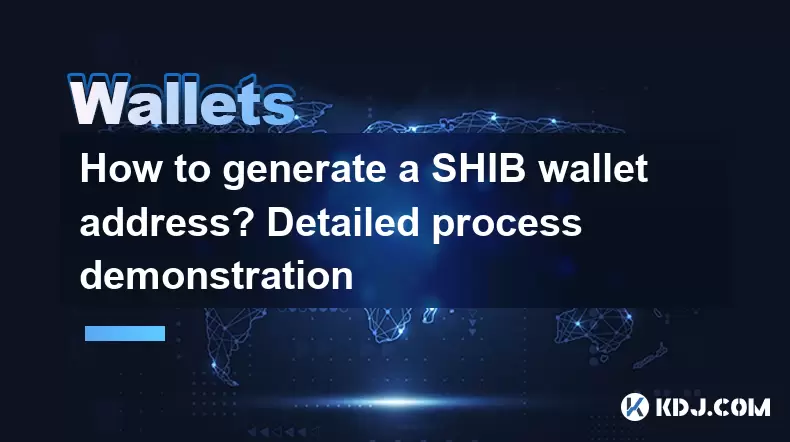
How to generate a SHIB wallet address? Detailed process demonstration
May 13,2025 at 08:43pm
Creating a SHIB (Shiba Inu) wallet address is a straightforward process that allows you to securely store, send, and receive SHIB tokens. This article will guide you through the detailed steps to generate a SHIB wallet address using popular methods such as MetaMask and Trust Wallet. Let's dive into the process. Choosing a Wallet PlatformBefore you can g...
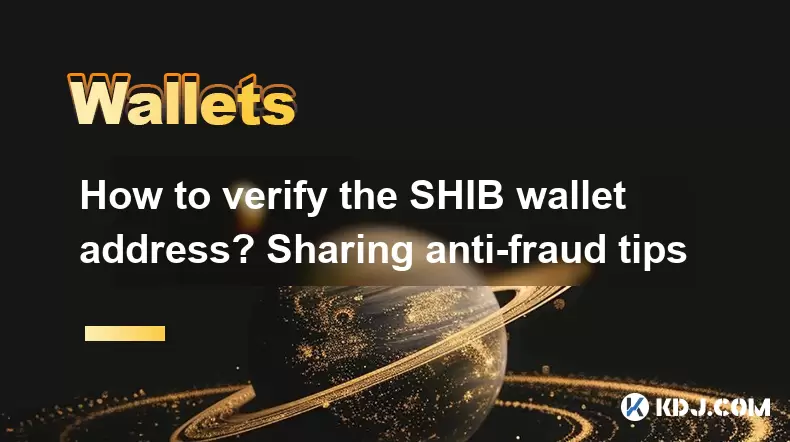
How to verify the SHIB wallet address? Sharing anti-fraud tips
May 13,2025 at 08:56pm
Verifying a SHIB (Shiba Inu) wallet address and protecting yourself from fraud are crucial steps in managing your cryptocurrency safely. This article will guide you through the process of verifying your SHIB wallet address and share essential anti-fraud tips to ensure your digital assets remain secure. Understanding SHIB Wallet AddressesBefore diving in...

What to do if SHIB wallet address is wrong? Troubleshooting steps
May 14,2025 at 04:28am
If you've entered the wrong SHIB wallet address, it can be a stressful situation, especially if you've already sent your SHIB tokens. However, there are several steps you can take to troubleshoot and potentially resolve the issue. Let's walk through the process step-by-step. Verify the Transaction DetailsThe first thing you should do is verify the trans...

Can SHIB wallet address be tracked? Anonymity analysis
May 14,2025 at 06:50am
The question of whether a SHIB wallet address can be tracked and the level of anonymity it provides is a crucial concern for many users in the cryptocurrency space. SHIB, or Shiba Inu, is a popular meme token that operates on the Ethereum blockchain. Understanding the traceability of SHIB wallet addresses involves delving into the nature of blockchain t...

How to share the SHIB wallet address? Correct method analysis
May 14,2025 at 02:50am
Sharing your SHIB wallet address is a common task for those involved in the cryptocurrency world, particularly if you're dealing with Shiba Inu (SHIB) tokens. However, it's crucial to understand the correct methods to share your wallet address to ensure the safety and security of your funds. This article will guide you through the process and highlight ...

How to protect the SHIB wallet address? Security setting tips
May 13,2025 at 04:07pm
Protecting your SHIB wallet address is crucial to safeguarding your cryptocurrency assets. With the rise of digital currencies, securing your wallet has become more important than ever. This article will provide you with detailed security setting tips to ensure your SHIB wallet remains safe from potential threats. Understanding SHIB Wallet SecurityBefor...

How to generate a SHIB wallet address? Detailed process demonstration
May 13,2025 at 08:43pm
Creating a SHIB (Shiba Inu) wallet address is a straightforward process that allows you to securely store, send, and receive SHIB tokens. This article will guide you through the detailed steps to generate a SHIB wallet address using popular methods such as MetaMask and Trust Wallet. Let's dive into the process. Choosing a Wallet PlatformBefore you can g...

How to verify the SHIB wallet address? Sharing anti-fraud tips
May 13,2025 at 08:56pm
Verifying a SHIB (Shiba Inu) wallet address and protecting yourself from fraud are crucial steps in managing your cryptocurrency safely. This article will guide you through the process of verifying your SHIB wallet address and share essential anti-fraud tips to ensure your digital assets remain secure. Understanding SHIB Wallet AddressesBefore diving in...
See all articles






















































































